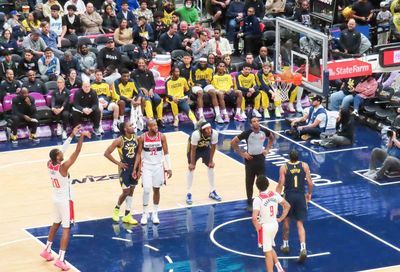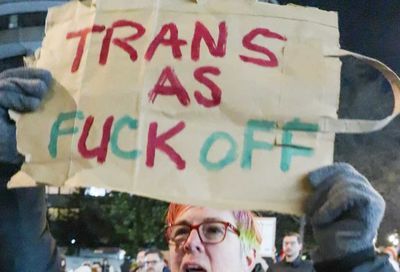Gay T & T
While the focus has been on GLAAD, a closer look shows AT&T's ongoing attempts to influence policy statements of LGBT organizations
The Gay & Lesbian Alliance Against Defamation’s decision to file a letter with the Federal Communications Commission supporting the merger of AT&T and T-Mobile – one of several such letters filed by LGBT and other traditionally progressive organizations – has brought scrutiny on the role AT&T has played in the public policy decisions of several nonprofit organizations in recent years.

Coronado
GLAAD board co-chair Roxanne Jones confirmed today that the organization’s president, Jarrett Barrios, submitted a resignation letter to the board and that he will be helping the organization ”manage the transition” for his successor.
But the Barrios resignation ends just one chapter in this saga. While recent attention has focused on GLAAD, the questions about the influence of AT&T – specifically the telecommunications giant’s lobbying efforts on proposed ”net neutrality” regulations – include a number of other national, high-profile LGBT organizations.
In addition to funding questions, a GLAAD board member, Troup Coronado, served as AT&T’s vice president for external affairs in Los Angeles until about six months ago. And, according to National Gay and Lesbian Task Force Executive Director Rea Carey – herself very familiar with Coronado’s LGBT lobbying – Coronado continues to serve as a consultant to AT&T through his current business, Troup Consulting Group Inc.
In his various roles, Coronado has served as the LGBT organizational liaison for AT&T in recent years. In addition, he has served as a board member for the Equality California Institute and GLAAD, a member of the Human Rights Campaign’s Business Council until March 2010, the dinner co-chair for the National Gay & Lesbian Chamber of Commerce (NGLCC) in 2009, and as the spokesman for AT&T when the company received an award from The Trevor Project in 2009.
Most recently, however, Coronado was the consultant helping AT&T get LGBT support for its proposed merger with T-Mobile. In part, he succeeded. GLAAD submitted a letter to the Federal Communications Commission (FCC) in support of the merger that was similar to letters of support sent by other organizations, including NGLCC and the National Association for the Advancement of Colored People (NAACP).
In fact, the directors of multiple LGBT organizations report that Coronado requested that their organization sign a letter – referred to by NGLCC president Justin Nelson as the ”LGBT sign-on” – supporting the merger. The Task Force’s Carey said that her group was approached by Coronado but turned down the request. An HRC spokesman also said that AT&T – but not Coronado – had asked HRC to send a letter supporting the merger but that the organization declined to do so.
Nelson told Metro Weekly of Coronado’s request, ”He did ask if we’ll do this LGBT sign-on, which, frankly, I knew that GLAAD was going to be a part of it and I assumed there were going to be other LGBT groups. It makes sense to us because it adds 50 million more people to broadband.”
Coronado did not respond to Metro Weekly‘s request for comment.
Regarding merger support from GLAAD, the NAACP, unions and others, however, Politco‘s Eliza Krigman reported on June 10, ”To build support, AT&T employees and consultants have been making personal visits and calls as well as holding luncheons. Out of about a dozen supporters interviewed by Politico, the vast majority said they decided to issue a statement supporting the AT&T/T-Mobile deal after being approached this way.”
In response to a request for comment on this story, AT&T spokesman Michael Balmoris said in a statement that AT&T practices ”inclusiveness” in its workplace and in the ”community initiatives and organizations” it supports.
Regarding the T-Mobile merger, he added, ”While we strongly believe our merger with T-Mobile will benefit all Americans by bringing next-generation wireless broadband to 97 [percent] of the country and 55 million more people, many living in rural communities, it’s up to the individual organizations to make their own evaluation from their own perspective.”
Although the unexpected support that several organizations gave to the merger of AT&T and T-Mobile has been described previously in terms that suggest this is a new development, the support for AT&T’s efforts – as has been pointed out at The Bilerico Project – is not new.
A Metro Weekly review of filings made to the FCC in 2009 and 2010 surrounding the ”net neutrality” and broadband regulations being considered by the agency show that – although some have been since withdrawn or clarified – GLAAD, NGLCC, the Task Force and Equality California submitted letters expressing opposition to or concern with the regulations or a desire for the commission ”not to rush” – as Equality California Executive Director Geoff Kors put it in his organization’s Oct. 12, 2009, letter – on ”consideration of whether new network neutrality rules are warranted.”
On Jan. 4, 2010, a letter on GLAAD letterhead was submitted under Barrios’s signature to the FCC stating, ”We feel that there is still much unknown about the consequences of net neutrality on Internet access and usage and we ask that the FCC address this.” As previously reported, the letter was withdrawn by Barrios on Jan. 15, 2010, because – as he put it in the follow-up letter – ”I have never seen this letter and it is not my signature. Furthermore, the contents of the letter do not accurately reflect the views of our organization.”
Almost precisely the same circumstances were reported by the Task Force’s Carey to have happened with her organization. The Task Force, which received $30,000 from AT&T in the past two years, submitted a letter to the FCC on Jan. 5, 2010, detailing that ”our organization has concerns over the FCC’s proposals to bring new net neutrality regulations to the Internet.”
Carey tells Metro Weekly, ”The letter was a response to a request by AT&T.” Like GLAAD, Carey continued, ”However, we quickly realized that we had not gone through an appropriate internal process on such policy matters and that the Jan. 5 letter did not accurately reflect our views. As a result, on Jan. 14, the Task Force submitted an additional letter to the FCC clarifying the organization’s position on net neutrality.”
Although the addendum letter was not available in a search of the FCC’s public filings, the Task Force provided a copy of the addendum that was sent to FCC Chairman Julius Genachowski. The letter stated, ”We are particularly encouraged by the Commission’s intention to make permanent the non-discrimination Internet principle prohibiting Internet Service Providers (ISP) from blocking, or limiting access to, legal content or applications available over the Internet.”
Today, talking about the incident, Carey said, ”We made a mistake, we realized it, and we corrected it right away.” At the same time, however, Carey was unaware of a letter dated June 3, 2009, that was submitted to the FCC under her signature and on the Task Force’s behalf. Although it does not specifically mention net neutrality, Carey acknowledged today – after reviewing the letter’s origin with Task Force staff – that ”the request to submit that 2009 letter came from AT&T.”
The next day, on June 4, 2009, GLAAD also submitted a letter, under the signature of then-president Neil Giuliano – that urged, ”The best way to accomplish this goal is for the FCC to draft a plan that will deliver access to unserved populations as its top priority.”
One day later, the NGLCC submitted a letter as well. Its letter was more aggressive than the other two, detailing, ”As the FCC considers a national broadband plan, the NGLCC hopes that the FCC will implement policies that maximize broadband adoption. In order to guarantee the best user experience, private sector providers must have the authority to manage their own networks.”
The NGLCC’s position is, as Nelson said in response to questions, well established.
”We have been opposed to net neutrality from the outset. Our position was not brought to us by AT&T,” Nelson said. ”I guess, maybe, we’re the libertarian view on this, and we have a long record of that. We don’t believe in any regulation. We don’t believe we should be regulating the Internet.”
He said that the NGLCC does work with AT&T, however, in coalitions surrounding issues such as broadband access and said that talking points are circulated among coalition members at different times.
Equality California interim Executive Director Jim Carroll, who has been with the organization since 2005, said he did not know the reason why then-executive director Geoff Kors sent the letter urging ”not to rush” net neutrality regulations in October 2009.
He did say, however, that Equality California ”support[s] the principle of net neutrality.” As to Coronado’s advocacy on behalf of AT&T, which is listed as the sole contributor of $250,000 or more to the organization, Carroll said, ”I don’t recall Troup Coronado asking anybody anything about public policy positions.”
Kors did not respond to Metro Weekly‘s request for comment and currently is, according to Carroll, in Florence, Italy.
Asked about AT&T requests for LGBT organizations to advocate against net neutrality, Balmoris referred Metro Weekly to his earlier statement that ”it’s up to the individual organizations to make their own evaluation from their own perspective.”
When Metro Weekly asked Carroll whether he could find out from Coronado whether Coronado had sought the 2009 Equality California letter, Carroll said, ”He hasn’t returned my call.”
He does, however, remain on the Equality California Institute board.
As for whether Coronado still sits on the GLAAD board, Jones told Metro Weekly, ”That’s not a part of my comment at this time.”
Asked for a list of current board members, Jones said that a list of board members is on the website. ”Our board list is public, it’s always been public.” Asked if the board list is accurate, she said, ”That’s a different question, and I … have no comment.”
Asked whether she had a list of GLAAD board members participating in the June 19 telephone board meeting, Jones said, ”No, I do not.”
Support Metro Weekly’s Journalism
These are challenging times for news organizations. And yet it’s crucial we stay active and provide vital resources and information to both our local readers and the world. So won’t you please take a moment and consider supporting Metro Weekly with a membership? For as little as $5 a month, you can help ensure Metro Weekly magazine and MetroWeekly.com remain free, viable resources as we provide the best, most diverse, culturally-resonant LGBTQ coverage in both the D.C. region and around the world. Memberships come with exclusive perks and discounts, your own personal digital delivery of each week’s magazine (and an archive), access to our Member's Lounge when it launches this fall, and exclusive members-only items like Metro Weekly Membership Mugs and Tote Bags! Check out all our membership levels here and please join us today!


















